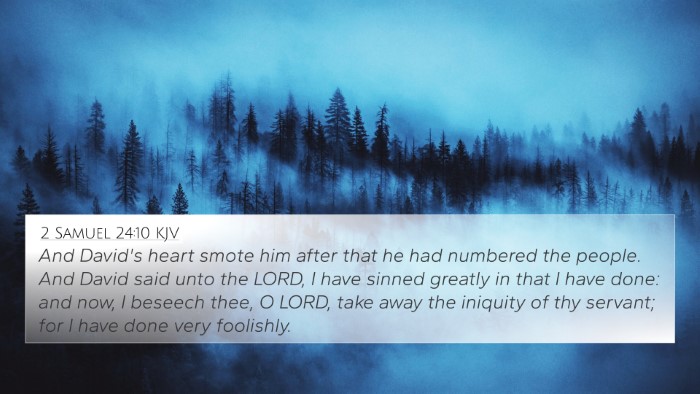Understanding 1 Samuel 24:5: A Commentary
1 Samuel 24:5 states: "And it came to pass, afterward, that David's heart smote him because he had cut off Saul's skirt." This verse captures a poignant moment in the narrative of David and Saul, showcasing profound themes of conscience, mercy, and the moral dimensions of leadership. Below is a detailed analysis of this verse, drawing from public domain commentaries.
Contextual Background
This verse occurs during a critical juncture when David has the opportunity to kill Saul but chooses instead to spare his life. This incident is significant within the wider story of David's rise and Saul's declining kingship. The moral implications of David’s actions provide insights into biblical ethics and the character of David as a leader.
Commentary Insights
Matthew Henry's Commentary: According to Henry, this verse illustrates David's sensitive conscience. Upon cutting Saul's skirt, David is filled with regret, indicating his deep respect for God's anointed leader. Henry emphasizes that even a small act against Saul weighs heavily on David's heart, reflecting a commitment to righteousness and moral integrity. This moment signifies the importance of maintaining a clear conscience and the weight of our actions as reflections of our character.
Albert Barnes' Commentary: Barnes notes that David’s heart smote him, not necessarily for the act of cutting off the skirt, but for the implications of his actions. He recognizes that any degree of harm toward Saul, God's anointed, is unacceptable. This awareness demonstrates David’s understanding of divine authority and a profound moral compass, which sets the foundation for his future kingship.
Adam Clarke's Commentary: Clarke elaborates on the psychological aspect of David’s remorse. He posits that David’s guilt reflects his awareness of how easily one can cross ethical lines, even with a seemingly minor action. David’s response serves as a lesson in humility and the importance of reflecting on one's motivations and choices in scenarios that challenge one's integrity.
Thematic Connections
This verse connects deeply with several themes throughout the Bible, emphasizing the complexity of human emotion in the face of divine ordination. Below are some cross-references that resonate with the themes presented in 1 Samuel 24:5:
- Exodus 22:28: This verse warns against reviling God’s messengers, illustrating the gravity of actions stemming from authority.
- Romans 13:1-2: Here, Paul speaks of the importance of submitting to governing authorities, reinforcing the notion that all authority is established by God.
- 1 Peter 2:17: Encourages respect towards all, specifically leaders, aligning with David's respect for Saul as king.
- Proverbs 20:2: Discusses the fear of a king, linking to the reverence David holds for Saul's position.
- Matthew 5:44: Jesus teaches about loving one’s enemies, drawing parallels to David’s mercy toward Saul.
- Luke 6:36-38: Encourages mercy, resonating with David’s decision to spare Saul and reflect on his own feelings of guilt.
- 1 Chronicles 29:29: Provides insight into God's protection over His anointed ones, further explicating Saul’s role as king relational to God’s will.
- James 4:17: Talks about knowing what is right and failing to do it, which mirrors David’s introspection after cutting Saul's skirt.
- Galatians 6:1: Advises restoration and gentleness towards those who stumble; a fitting principle reflecting David’s remorseful heart.
- Psalm 51:17: "The sacrifices of God are a broken spirit; a broken and contrite heart." This reinforces David’s conscience regarding his behavior.
Connecting Themes Across Scripture
The connections between Bible verses serve as a rich tapestry of inter-Biblical dialogue. The sensitivity of conscience displayed by David finds echoes throughout scripture, teaching about the importance of integrity. The thematic connections can be explored through:
- Bible verse cross-references: Linking cross-references allows for a deeper understanding of a single verse's implications.
- Comparative Bible verse analysis: Examining similar themes across different texts heightens one’s grasp of biblical morality.
- Cross-referencing Biblical texts: Forms a cohesive view of scriptural ethics, enhancing rhetorical depth.
- Thematic Bible verse connections: Highlighting shared themes, such as mercy and authority, that enrich Biblical studies.
Tools for Bible Cross-Referencing
For further exploration of related biblical texts, consider utilizing:
- Bible concordance: Helps locate terms and associated verses effectively.
- Bible cross-reference guide: Assists in identifying key relationships between verses.
- Bible reference resources: Provide comprehensive insights for sermon preparation and deeper study.
Conclusion
1 Samuel 24:5 offers a powerful narrative on the themes of conscience and moral responsibility. By examining David’s reaction, it becomes evident that even minor decisions hold significant weight under the eyes of God. The broader connections with other scriptural references illuminate the imperative of ethical integrity in leadership and personal conduct. We encourage readers to actively engage with these connections, exploring further the nuances of biblical teachings through diligent cross-referencing.






